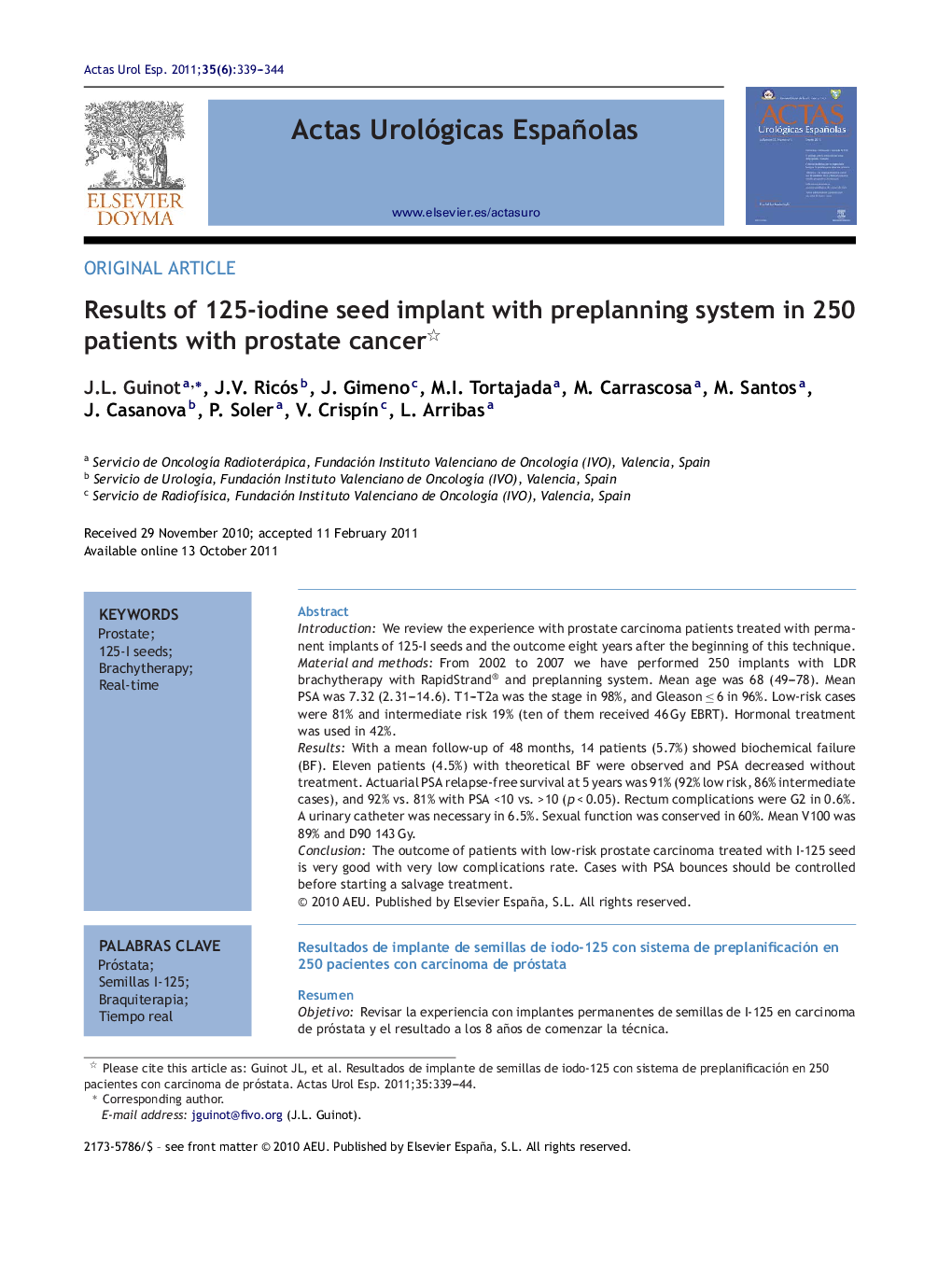| Article ID | Journal | Published Year | Pages | File Type |
|---|---|---|---|---|
| 3845993 | Actas Urológicas Españolas (English Edition) | 2011 | 6 Pages |
IntroductionWe review the experience with prostate carcinoma patients treated with permanent implants of 125-I seeds and the outcome eight years after the beginning of this technique.Material and methodsFrom 2002 to 2007 we have performed 250 implants with LDR brachytherapy with RapidStrand® and preplanning system. Mean age was 68 (49–78). Mean PSA was 7.32 (2.31–14.6). T1–T2a was the stage in 98%, and Gleason ≤ 6 in 96%. Low-risk cases were 81% and intermediate risk 19% (ten of them received 46 Gy EBRT). Hormonal treatment was used in 42%.ResultsWith a mean follow-up of 48 months, 14 patients (5.7%) showed biochemical failure (BF). Eleven patients (4.5%) with theoretical BF were observed and PSA decreased without treatment. Actuarial PSA relapse-free survival at 5 years was 91% (92% low risk, 86% intermediate cases), and 92% vs. 81% with PSA <10 vs. >10 (p < 0.05). Rectum complications were G2 in 0.6%. A urinary catheter was necessary in 6.5%. Sexual function was conserved in 60%. Mean V100 was 89% and D90 143 Gy.ConclusionThe outcome of patients with low-risk prostate carcinoma treated with I-125 seed is very good with very low complications rate. Cases with PSA bounces should be controlled before starting a salvage treatment.
ResumenObjetivoRevisar la experiencia con implantes permanentes de semillas de I-125 en carcinoma de próstata y el resultado a los 8 años de comenzar la técnica.Material y métodosDe 2002 a 2007 hemos realizado 250 implantes con braquiterapia de baja tasa con RapidStrand® y sistema de preplanificación. La edad media fue 68 años (49-78). El PSA medio fue 7,32 (2,31-14,6), 98% T1-T2a, 96% Gleason ≤ 6, 81% de bajo riesgo y 19% de riesgo intermedio (10 de estos últimos recibieron 46 Gy de radioterapia externa). Un 42% recibieron hormonoterapia.ResultadosCon seguimiento medio de 48 meses, 14 pacientes (5,7%) tuvieron recaída bioquímica (RB). En 11 pacientes (4,5%) con teórica RB el PSA descendió espontáneamente sin tratamiento. La supervivencia actuarial sin recaída bioquímica a 5 años fue del 91% (92% bajo riesgo, 86% riesgo intermedio); 92 vs 81% en pacientes con PSA < 10 vs > 10 (p < 0,05). Hubo complicaciones rectales G2 en el 0,6%, sondaje vesical en un 6,5%; el 60% conservaron la función sexual. El V100 medio fue del 89% y el D90 143 Gy.ConclusiónEl resultado en carcinoma de próstata de bajo riesgo mediante semillas de Iodo-125 es muy bueno con muy pocas complicaciones. Las elevaciones de PSA deberían ser controladas antes de dar tratamiento de rescate.
